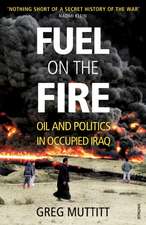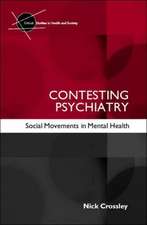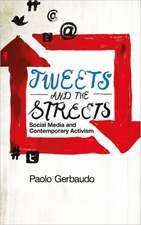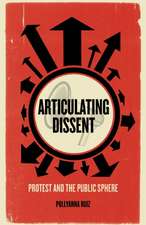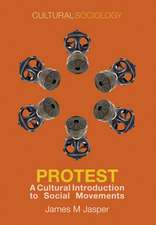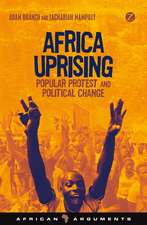Trust and Terror: Social Capital and the Use of Terrorism as a Tool of Resistance: Conceptualising Comparative Politics
Autor Ammar Shamailehen Limba Engleză Hardback – 2 mai 2017
This book explores these questions by delving into the relationship between interpersonal trust and the nature of the political movements that individuals choose to join. Utilizing the examples of the Arab Spring uprisings in Egypt, Libya and Syria, a novel theoretical model that links the literature on social capital and interpersonal trust to violent collective action is developed and extended. Beyond simply bringing together two lines of literature, this theoretical model can serve as a prism from which the decision to join terrorist organizations or violent movements may be analyzed. The implications of the theory are then examined more closely through an in-depth look at the behavior of members of political movements at the outset of the Arab Spring, as well as statistical tests of the relationship between interpersonal trust and terrorism in the Middle East and globally.
Trust and Terror will be of interest to scholars of Comparative Politics and International Relations.
The Open Access version of this book, available at https://doi.org/10.4324/9781315505817, has been made available under a Creative Commons Attribution-Non Commercial-No Derivatives 4.0 license.
| Toate formatele și edițiile | Preț | Express |
|---|---|---|
| Paperback (1) | 256.07 lei 6-8 săpt. | |
| Taylor & Francis – 30 sep 2020 | 256.07 lei 6-8 săpt. | |
| Hardback (1) | 762.57 lei 6-8 săpt. | |
| Taylor & Francis – 2 mai 2017 | 762.57 lei 6-8 săpt. |
Din seria Conceptualising Comparative Politics
-
 Preț: 280.80 lei
Preț: 280.80 lei -
 Preț: 363.96 lei
Preț: 363.96 lei -
 Preț: 383.89 lei
Preț: 383.89 lei -
 Preț: 351.66 lei
Preț: 351.66 lei -
 Preț: 466.45 lei
Preț: 466.45 lei -
 Preț: 278.75 lei
Preț: 278.75 lei -
 Preț: 411.60 lei
Preț: 411.60 lei - 17%
 Preț: 256.07 lei
Preț: 256.07 lei - 26%
 Preț: 762.16 lei
Preț: 762.16 lei - 12%
 Preț: 312.35 lei
Preț: 312.35 lei -
 Preț: 388.52 lei
Preț: 388.52 lei -
 Preț: 388.52 lei
Preț: 388.52 lei -
 Preț: 360.48 lei
Preț: 360.48 lei -
 Preț: 369.18 lei
Preț: 369.18 lei - 16%
 Preț: 260.63 lei
Preț: 260.63 lei -
 Preț: 357.59 lei
Preț: 357.59 lei - 17%
 Preț: 239.51 lei
Preț: 239.51 lei
Preț: 762.57 lei
Preț vechi: 1026.45 lei
-26% Nou
Puncte Express: 1144
Preț estimativ în valută:
145.95€ • 151.80$ • 122.31£
145.95€ • 151.80$ • 122.31£
Carte tipărită la comandă
Livrare economică 14-28 martie
Preluare comenzi: 021 569.72.76
Specificații
ISBN-13: 9781138201736
ISBN-10: 1138201731
Pagini: 160
Ilustrații: 36
Dimensiuni: 152 x 229 x 16 mm
Greutate: 0.36 kg
Ediția:1
Editura: Taylor & Francis
Colecția Routledge
Seria Conceptualising Comparative Politics
Locul publicării:Oxford, United Kingdom
ISBN-10: 1138201731
Pagini: 160
Ilustrații: 36
Dimensiuni: 152 x 229 x 16 mm
Greutate: 0.36 kg
Ediția:1
Editura: Taylor & Francis
Colecția Routledge
Seria Conceptualising Comparative Politics
Locul publicării:Oxford, United Kingdom
Public țintă
Postgraduate and UndergraduateCuprins
Table of Contents
Preface
Chapter 1: Introduction
Chapter 2: Trust, Terror and The Arab Spring: Egypt, Libya And Syria
Chapter 3: Theory: The Relationship Between Trust And Terror
Chapter 4: Islamist Political Mobilization In Egypt, Libya And Syria
Chapter 5: The Syrian Protester’s Dilemma
Chapter 6: Generalized And Particularized Interpersonal Trust And Support For Terrorism: Evidence From Five Arab States
Chapter 7: Generalized Interpersonal Trust And The Prevalence Of Domestic Terrorist Activity: A Cross-Country Study
Chapter 8: Conclusion
References
Appendices
Appendix A
Appendix B
Appendix C
Index
Preface
Chapter 1: Introduction
Chapter 2: Trust, Terror and The Arab Spring: Egypt, Libya And Syria
Chapter 3: Theory: The Relationship Between Trust And Terror
Chapter 4: Islamist Political Mobilization In Egypt, Libya And Syria
Chapter 5: The Syrian Protester’s Dilemma
Chapter 6: Generalized And Particularized Interpersonal Trust And Support For Terrorism: Evidence From Five Arab States
Chapter 7: Generalized Interpersonal Trust And The Prevalence Of Domestic Terrorist Activity: A Cross-Country Study
Chapter 8: Conclusion
References
Appendices
Appendix A
Appendix B
Appendix C
Index
Notă biografică
Ammar Shamaileh is an assistant professor in the Department of Political Science at the University of Louisville, USA. His current research agenda focuses primarily on the relationship between informal institutions or cultural phenomena and political behavior and violence in the Middle East.
Recenzii
'This book provides a very unorthodox treatment of the Arab Spring by looking into the association between interpersonal trust and terrorism. Shamaileh develops a novel theory that explains how the state of social capital at individual level might have shaped the differential outcomes of the Arab Spring in Egypt, Libya, Syria, and beyond. The theoretical and empirical analysis presented in this timely book is a fine example of social scientific inquiry at its best. The author brings a wealth of evidence ranging from in-depth analysis of cases to large-N quantitative analysis to test the rich theoretical propositions. Trust and Terror will be a valuable resource for students of comparative politics and Middle Eastern studies as well as to policymakers.' - Sabri Ciftci, Michael W. Suleiman Chair in Arab and Arab-American Studies, Kansas State University
'To illustrate the critical interaction between general levels of interpersonal trust and the options to which individuals resort when addressing grievances, Shamaileh shows the depth of his analytical range, adeptly bringing together formal modeling, case studies, interviews, statistical analysis, and even Foucauldian interpretative analysis of satirical comic caricatures of Assad and popular comedy skits. Throughout the work, the author’s logic drives home the mechanisms behind the inevitable outcome of the Syrian protests and the relationship between the cultivated lack of trust in Syrian society and the recourse to terrorism as the means to counter the state.' - Michael Wuthrich, Academic Director of Global & International Studies Programs, University of Kansas
'Shamaileh offers a novel and persuasive argument about the effects of trust and interpersonal ties on individuals’ choices to pursue non-violent versus violent means of resistance. The book makes a major contribution to growing research on how the characteri
'To illustrate the critical interaction between general levels of interpersonal trust and the options to which individuals resort when addressing grievances, Shamaileh shows the depth of his analytical range, adeptly bringing together formal modeling, case studies, interviews, statistical analysis, and even Foucauldian interpretative analysis of satirical comic caricatures of Assad and popular comedy skits. Throughout the work, the author’s logic drives home the mechanisms behind the inevitable outcome of the Syrian protests and the relationship between the cultivated lack of trust in Syrian society and the recourse to terrorism as the means to counter the state.' - Michael Wuthrich, Academic Director of Global & International Studies Programs, University of Kansas
'Shamaileh offers a novel and persuasive argument about the effects of trust and interpersonal ties on individuals’ choices to pursue non-violent versus violent means of resistance. The book makes a major contribution to growing research on how the characteri
Descriere
Why do some individuals choose to protest political grievances via non-violent means, while others take up arms? What role does whom we trust play in how we collectively act?

